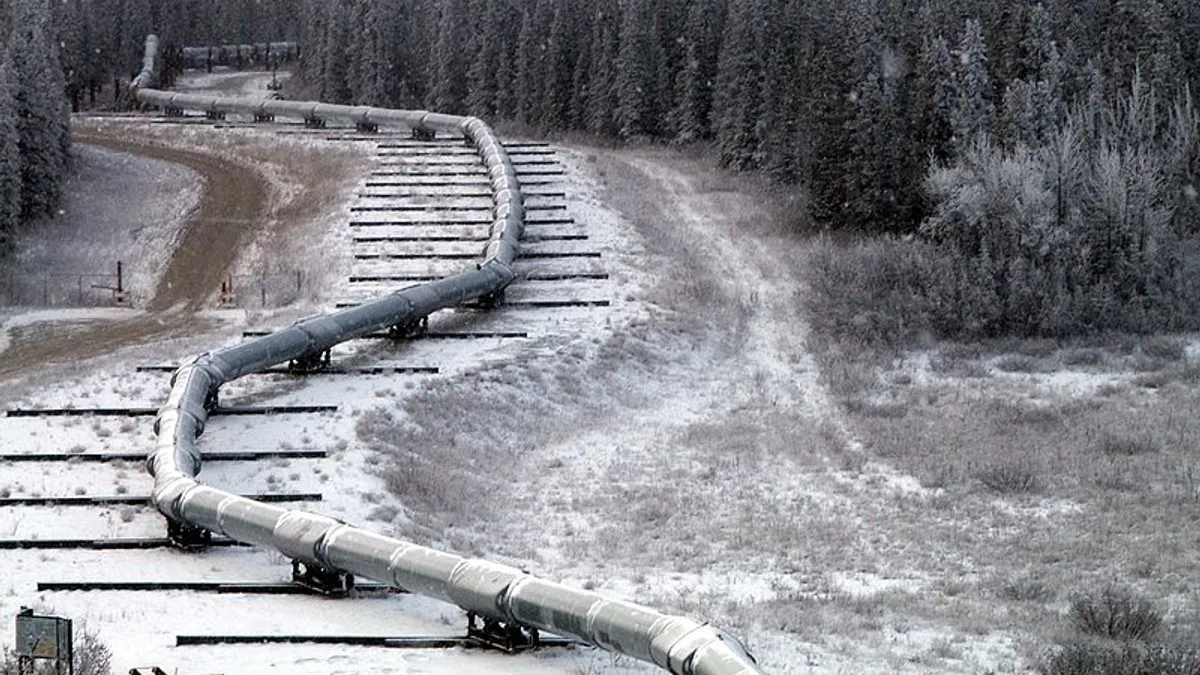Dive Brief:
- The Federal Energy Regulatory Commission on Tuesday announced an inquiry by its staff has revealed no capacity withholding by gas utilities on the Algonquin pipeline.
- The inquiry came after a report from the Environmental Defense Fund asserted that two utilities, Eversource and Avangrid, artificially constrained pipeline capacity for years, increasing electricity prices for the region by more than $3 billion.
- A FERC release called the report "flawed" said staff "found no evidence of capacity withholding" but offered no more detail on its investigation. Eversource welcomed the conclusion, while EDF did not immediately respond to a request for comment.
Dive Insight:
The EDF report, published in October 2017, found that local utilities owned by Eversource and Avangrid regularly scheduled more gas than they needed on the Algonquin Pipeline in Connecticut and Massachusetts, only to cancel some of the orders later in the day — too late for the pipeline space to be resold.
That practice, known as down-scheduling, was used most intensively on the coldest days, including during the 2014 Polar Vortex. From 2013 to 2016, EDF researchers estimated that the practice cost New England electricity consumers $3.6 billion by raising the cost of natural gas that flowed to generators.
The report sparked regulatory inquiries in Connecticut and Massachusetts, a class action lawsuit by a dozen Eversource customers and led Sen. Richard Blumenthal (D-CT) to call for a FERC investigation.
Eversource and Avangrid don’t deny that they engaged in the down-scheduling practice, but argue they did so to ensure they had adequate pipeline capacity available if weather conditions or other factors unexpectedly increased gas demand. In December, Eversource threatened EDF with a lawsuit over its "false and defamatory statements" on gas purchasing.
FERC on Tuesday said it had evaluated whether the two utilities had withheld capacity "in order to drive up gas and/or power prices in the region."
"Commission staff took these allegations very seriously and conducted an extensive review of both publicly available and non-public data," FERC said in a release. "On the basis of that review, staff determined that EDF’s study was flawed and led to incorrect conclusions about the alleged withholding."
Eversource said the FERC conclusion validates findings from a new report it commissioned from Boston management and consulting firm Levitan and Associates.
"[O]ur gas supply management practices are carried out on a day-to-day basis in line with industry best practices to fulfill our core public-service obligation to customers,” Eversource President of Gas Operations Bill Akley said in a statement. “As a local gas company, we are required to make sure our customers have enough gas to heat their homes, particularly on cold New England nights."
The debate over gas scheduling may not end with FERC's conclusion, however. EDF researchers stressed in their report and subsequent interviews with Utility Dive that they did not seek to assign motive to the scheduling actions — such as if the utilities down-scheduled to raise gas or power prices.
The larger point, they said, is that more detailed valuation of gas pipeline capacity throughout the day — such as on a 15 minute basis — could prevent such capacity withholding concerns in the future, as well as help inform pipeline siting decisions and create a market for non-gas resources to provide power services.
When the EDF report was released in October, outside experts told Utility Dive these valuation concerns are legitimate regardless of the outcome of the Eversource and Avangrid inquiries.
“Whether this particular analysis is right or not, it certainly suggests there is a need for much more focus on getting the rules and the tariffs accurate and better structures as the entire nation moves toward higher levels of gas dependency,” former Maine utility regulator David Littell said. “With New England as the canary in the coalmine, this shows some real structural issues with rules and the way the industry is set up right now.”
Correction: An earlier version of this post referred to Levitan and Associates as a law firm.













